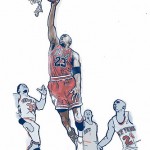Most people have the will to win, few have the will to prepare to win. – Bobby Knight
 What does that mean?
What does that mean?
In sports, preparation is everything (with the possible exception of luck). You have to know your plays and plans inside and out. You need to know the other players like you know yourself. If something goes wrong with the play, where will the other players go?
If you can’t answer those questions, you haven’t done enough preparation. And there really aren’t any shortcuts. Then there are the fundamentals. Someone who practices the basics for hours every day is much less likely to goof up on game day.
The lists could go on for quite a while, but if you’ve ever played a sport or worked hard in a competition, you know what I’m talking about. That is what separates the professionals from the talented amateurs. The job of the professional is to prepare, full time, year round.
Why is preparation important?
Without preparation, you are relying on raw talent and luck. If you’ve got those, why not complete the triangle and add preparation? Yes, preparation is hard work. Yes, preparation is rarely as much fun as doing it for real. Yes, preparation takes lots of time. But loosing because you weren’t prepared, that just stinks. On ice. Or on the hardwood, the grid iron or anyplace else.
In life, preparation can mean the difference between getting the job, or just another interview (you do know something about the company and have an intelligent question to ask, right?). Preparation can be the difference between another blind date, or getting a second date (what kind of flowers did you get her, the ones she’s allergic to?).
Preparation can even be critical in projects around the house. Ever start baking and then find out you’re low on flour? Proper preparation involves checking and pre-measuring the ingredients, right? Yeah, not so much fun, and it takes more time, but failing to finish a birthday cake on the proper day is even less fun, right?
Where can I apply this in my life?
As I mentioned above, preparations have a useful place in your everyday life. For big events, it is even more important. Interviews, first dates (first anything, for that matter, can’t make a second first impression, right?), even household activities take preparation.
Our wedding was not that big, nor was it very elaborate, but it was practically flawless. Why? We were prepared. Details were planed out, reservations were made well in advance, forms were filled out, the proper people found, contacted, and hired. Even the things that didn’t go exactly to plan were handled easily because we were prepared.
Bobby Knight coached basketball, and knew what it took to win. He won a lot. He had a very low tolerance for lazy people. He didn’t have the greatest people skills, but he was able to get things done on the basketball court.
How about you? What do you do on a regular basis? If you are in a profession, what do you do to keep current with the changes in your field? When do you practice the basics, the fundamentals? Do you even know what they are, can you describe them?
For me as a software weenie, I need to keep my fingers moving and my mind sharp. I subscribe to technical journals and read many more online. I’ve taken classes, and even taught a little bit as well.
Pick something you do a fair bit of, but really need or want to get better at. It could be work, recreation, curiosity or whatever. It doesn’t have to even be the right one this time, you can try again later on with a different topic if you like.
With the activity in mind, what are the fundamentals? Is there manipulation with hands, feet, or other parts of the body? Do you need to keep an eye on something? Do you need to be able to do strange things with your tongue (like the rolled ‘r’ in Spanish)? What other skills do you need to work on, like balance (under what conditions) or rhythm (for musical instruments or singing)?
For any of the questions above, answer this: How do you practice that fundamental? In martial arts, you do stances over and over. You do rolls, kicks, punches, blocks and basic drills over and over (and over and over). Come up with two or three ways to do whatever it is that needs to be done. Repetition is the mother of skill, and you don’t want to get bored, right?
Wow, that’s a lot of work. I wonder how many hours people put in to get their smile just right? I wonder how many hours people spend practicing reaching out to shake a hand? I wonder how many hours you are going to spend to get better at what you want to do?
There is no replacement for hard work, and practicing the fundamentals is the hardest work out there. But it will make a difference. It took quite some time to get triple tonguing to work, but for a brass player, you really need it if you want to be truly top notch.
What are you willing to do? How much effort are you willing to put in? What is winning worth to you? Have you got it in you? The last question was rhetorical, of course you have it in you. But are you willing to do the work? Only you can answer that question. You can prepare to win or throw in the towel (or chair, if that’s more your style).
From: Twitter, @Sports_Greats
confirmed at : http://www.brainyquote.com/quotes/quotes/b/bobbyknigh130012.html
Photo by soundfromwayout






